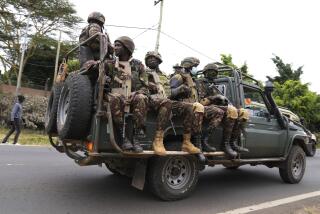Hunger, violence stalk the streets of Nairobi
- Share via
NAIROBI, KENYA — In Nairobi’s slum district of Kibera, people prayed for peace Sunday under the charred cross and blackened walls of the burned Lutheran church. But in the narrow alleys just 100 yards away, the thugs with machetes still rule.
When the service ended, the parishioners in their Sunday best walked home through neighborhoods still teetering on a knife’s edge.
Just after the service, around the corner from the church, the intimidation went on: An angry, wild-eyed young man with a machete shouted at a woman standing by her gate.
She cringed, terrified, as he whacked her with the flat of the blade.
With no sign of a solution to Kenya’s political impasse, an opposition rally planned for Tuesday has raised fears of a new increase in killings.
Last month’s presidential election unleashed tribal violence across Kenya, pitting Luos and others who support opposition leader Raila Odinga against Kikuyus and their allies who support President Mwai Kibaki.
Odinga accuses Kibaki of stealing the Dec. 27 election. Western observers said the poll did not meet democratic standards. More than 300 people have died in the violence.
As one parishioner, Rebecca Muthoni, a 38-year-old Kikuyu, plodded to the Lutheran church Sunday, her heart was heavy. Muthoni’s shack and the kindergarten where she taught children had been burned, as well as her church.
As Pastor Dennis Meeker prayed, she fell to the ground, tears flowing from her eyes, crying out hysterically: “Forgive them! Forgive them!”
As she yelled, Meeker repeated over and over, “We shall persevere.”
“My pain is really deep,” she said after the service. “I am feeling bad in my heart. I have no house and no job. And I am the only breadwinner in the family.”
The fire spared the church walls, but there was a black scar on the wall behind the altar with a white patch in the center. Meeker plans to leave it there to remind people what happened in Kibera over the last week: To him, the black mark represents Christ’s descent to hell and the white patch his resurrection. Meeker said the attacks could destroy the building but not the church, and urged the congregation to forgive.
Meeker, an American who arrived from Iowa in September, has faced his own inner struggle since the church was burned Thursday by looters during opposition protests.
“You struggle with anger. You struggle with weeping,” he said. “I don’t think you can make sense out of it. In fact, this is caused by politicians because we were really living in peace and going along well until the presidential election.”
The congregation is drawn from a mix of tribes, but about half the parishioners did not come to church Sunday, given the violence in the area.
“I think it is going to get worse because [the political leaders] are both standing firm. They don’t want to walk the way of peace,” Meeker said.
“Kenya is going to bow down to really bad things if they’re not careful. There’s going to be a lot of hatred and a lot of killings.”
Severe food shortages in Kibera and other slum districts have fueled the instability, particularly in Luo areas, where there is deep anger over the elections.
Nairobi has long been the thriving capital of East Africa’s strongest economy, so the last week’s chaos has brought a new sight: thousands of desperate people lined up at food distribution centers, pushing and jostling for aid.
On Sunday, the International Committee of the Red Cross had to move its food distribution from a crowded neighborhood in the Mathare district to a nearby police compound when the crowd got out of hand. Hundreds of people sprinted along behind the Red Cross trucks and joined hundreds more hungry residents at the compound. All of them pressed against the gates waiting for food.
The Luo areas have been harder hit by the food crisis. Many of the shops in those zones were owned by Kikuyus, who fled after their businesses were burned and looted.
Although the Nairobi slum districts are very poor, residents generally have access to food. But women queuing for aid Sunday at the Mathare police compound said their families had not eaten since Friday.
“I never thought I would see a situation such as this. We feel terrible because we are suffering,” said Peris Omutoko, 40, with two children, ages 5 and 10. “We don’t have food in our area. The shops are closed. There is no money. We don’t have a way to get food.”
As people jostled for food in the police compound, opposition lawmaker Margaret Wanjiru of Raila’s Orange Democratic Movement arrived. Addressing the clamoring crowd through speakers mounted on a vehicle, she told them that she had brought the food in the Red Cross trucks. (In fact, the aid was supplied by the World Food Program and distributed by the Red Cross.)
The crowd stopped pushing and shoving and started cheering wildly.
She called for an end to the tribal violence that has racked Mathare and other slum districts in her constituency of Starehe.
“We do not want to see tribalism in Starehe constituency. Tell your neighbor it doesn’t matter which tribe you are,” she said, before speeding off in an SUV.
Soon after she departed, the food distribution deteriorated into chaos.
As angry men in the crowd began abusing Red Cross officials, paramilitary riot police were called in. They beat back people using long sticks, even as the handouts continued. The food ran out around sunset.
--
More to Read
Sign up for Essential California
The most important California stories and recommendations in your inbox every morning.
You may occasionally receive promotional content from the Los Angeles Times.










